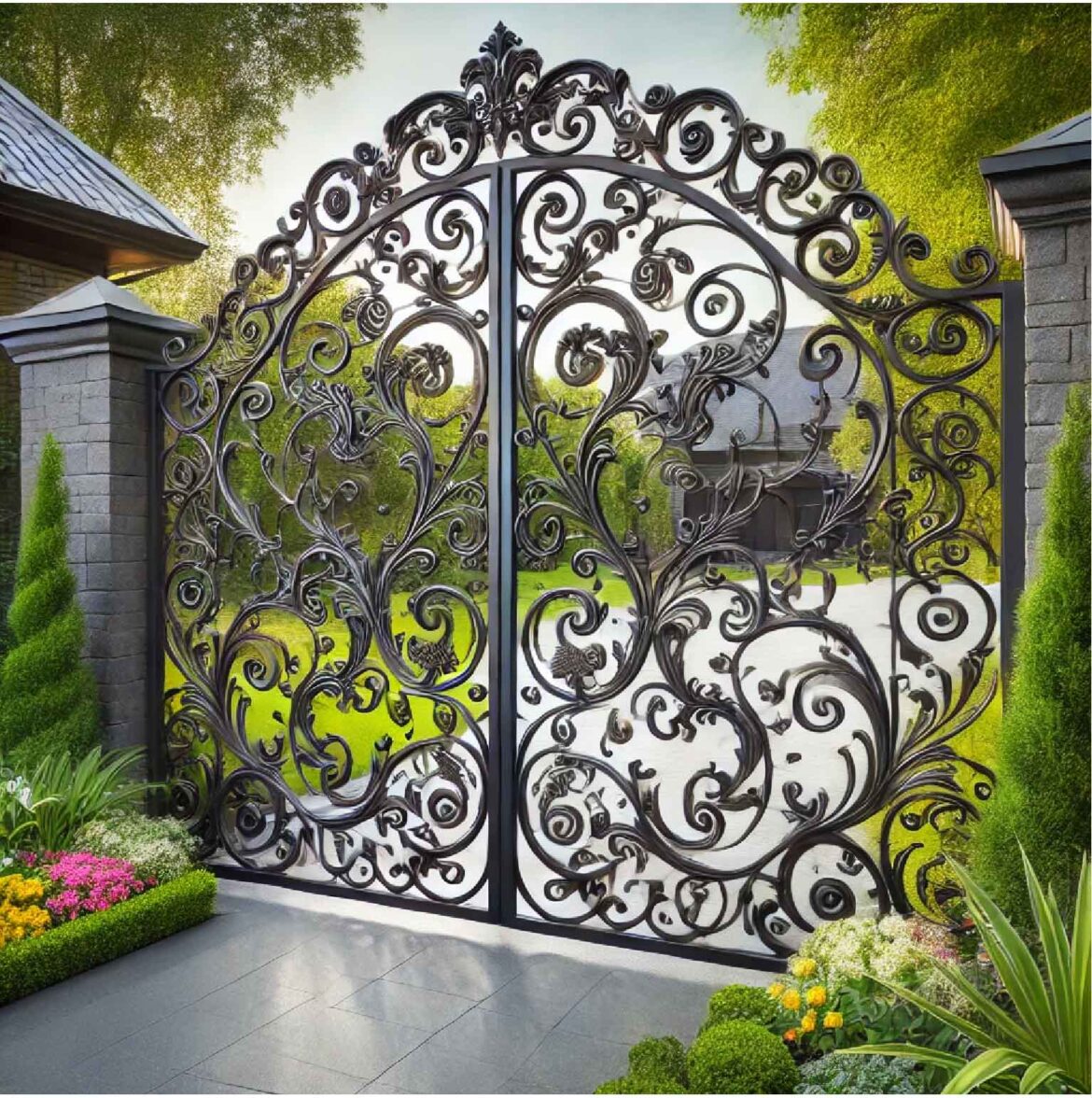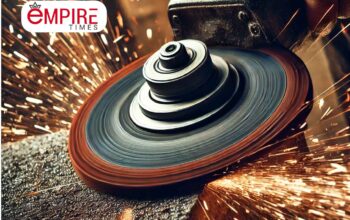What Are Iron Gates?
Iron gates are entrance or security gates made primarily from iron. They are known for their strength, durability, and timeless appeal. Iron gates can be designed in various styles, from simple and functional to elaborate and decorative. They are often used in residential, commercial, and industrial settings to provide security and add aesthetic value.
Types of Iron Gates
There are several types of iron gates available to suit different needs and preferences:
- Wrought Iron Gates: These are made from wrought iron, a material known for its malleability and strength. Wrought iron gates are often used for their decorative appeal, with intricate designs and patterns.
- Cast Iron Gates: Cast iron gates are made by pouring molten iron into molds. They are known for their robust build and classic look. Cast iron gates are heavier and more durable but are often less detailed than wrought iron gates.
- Steel Iron Gates: Sometimes referred to as “iron gates,” steel gates are actually made from steel but have the appearance of iron. They offer similar strength but are usually lighter and more resistant to rust.
- Automatic Iron Gates: These gates can be opened and closed automatically using remote controls, sensors, or keypads. Automatic iron gates are convenient and provide extra security for both residential and commercial properties.
Benefits of Iron Gates
Iron gates offer several advantages that make them a popular choice:
- Security: Iron gates are strong and provide a high level of security. They are difficult to break or cut through, making them an effective barrier against intruders.
- Durability: Iron is a long-lasting material that can withstand harsh weather conditions, including rain, snow, and heat. With proper maintenance, iron gates can last for many years.
- Aesthetic Appeal: Iron gates add a touch of elegance and sophistication to any property. They can be customized with different designs, patterns, and finishes to match the style of your home or business.
- Low Maintenance: Iron gates require minimal maintenance compared to other types of gates. With regular cleaning and occasional painting, they can maintain their appearance for a long time.
- Increased Property Value: Installing iron gates can enhance the curb appeal of your property, potentially increasing its value.
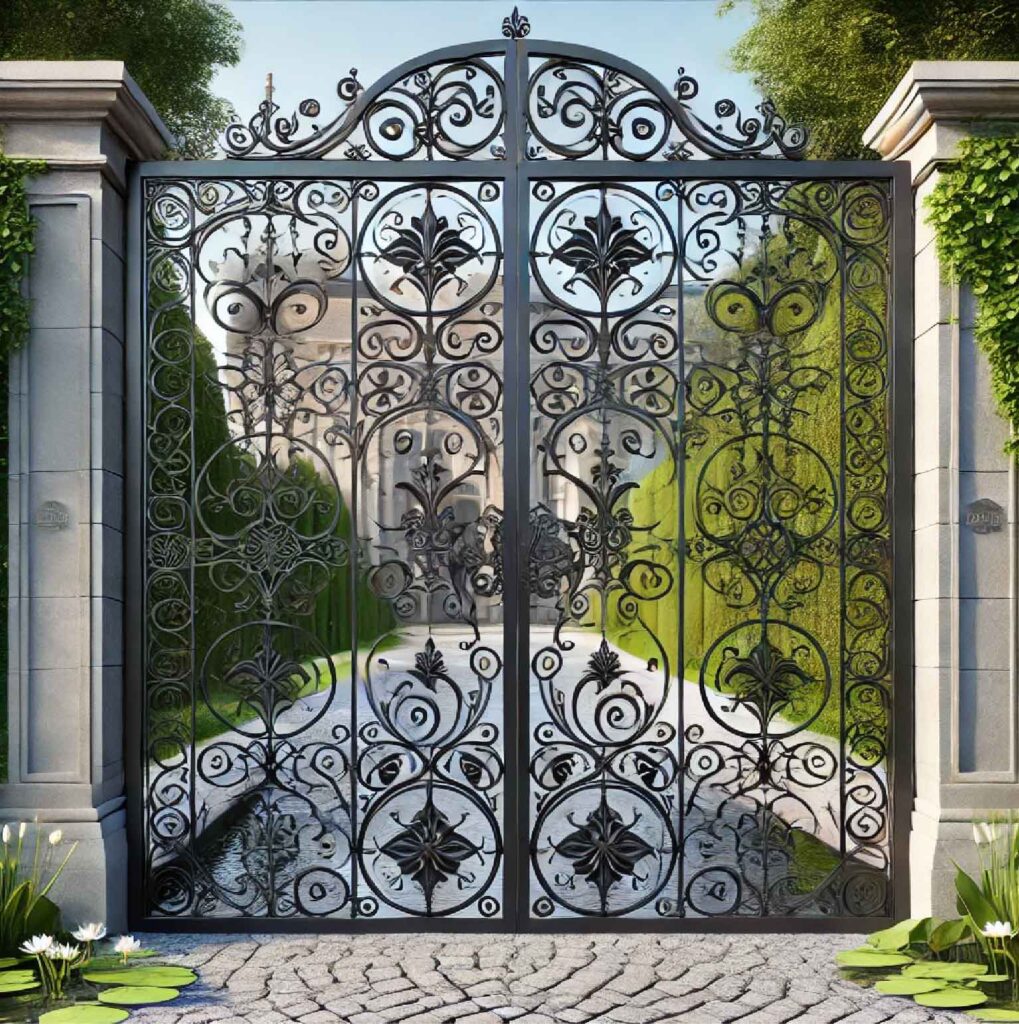
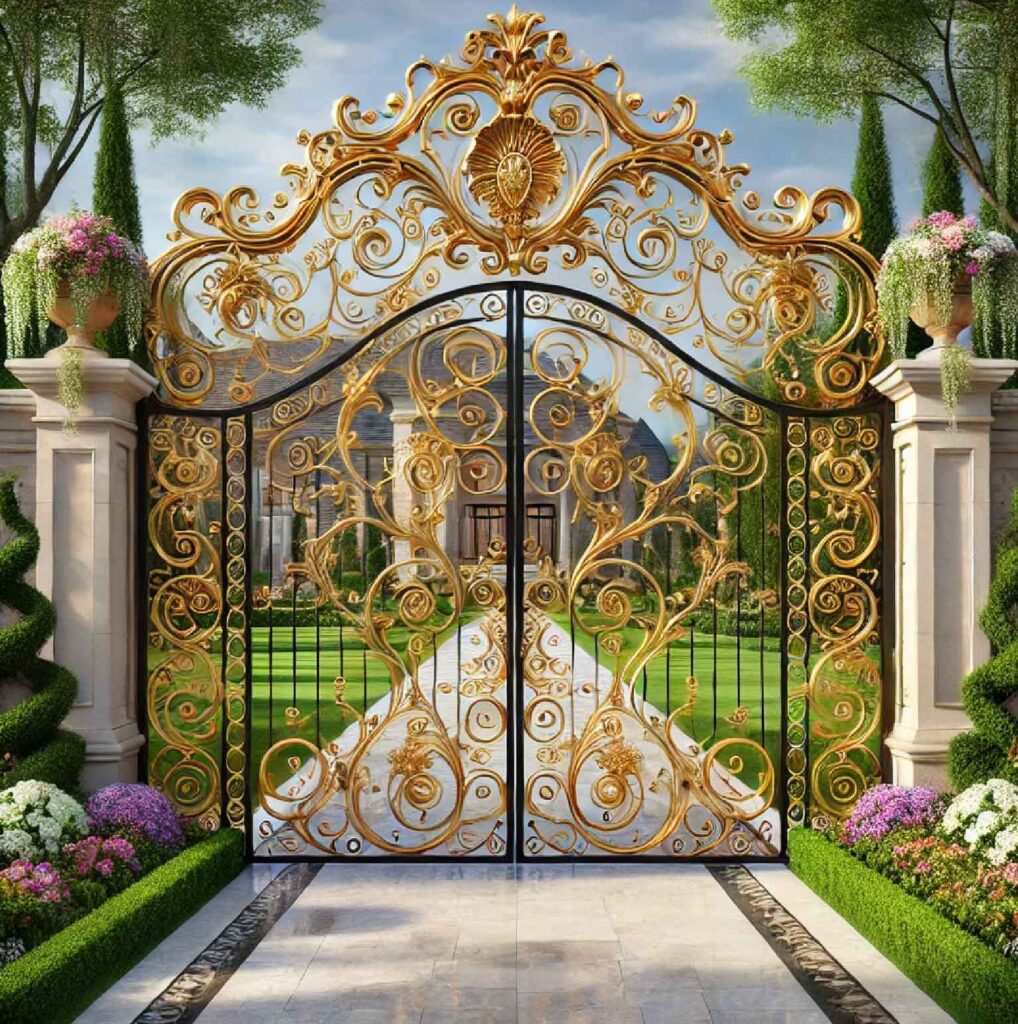
How to Choose the Right Iron Gate
Choosing the right iron gate for your property involves considering several factors:
- Purpose: Determine whether you need the gate primarily for security, aesthetics, or both. This will help you decide on the style and type of iron gate.
- Size and Design: Measure the area where the gate will be installed and choose a design that complements your property. Consider the height, width, and overall style of the gate.
- Material: Decide between wrought iron, cast iron, or steel iron gates based on your budget, style preference, and maintenance requirements.
- Manual or Automatic: Choose between a manual or automatic gate. Automatic gates provide more convenience and security, but they may require a higher upfront investment and maintenance.
- Budget: Consider your budget for the gate, including the cost of installation and any additional features like automation or custom designs.
Installing Iron Gates
Installing iron gates involves several steps:
- Choose a Gate Style and Size: Decide on the type of iron gate that fits your needs and the size that suits your entrance.
- Select a Contractor: Hire a professional contractor with experience in installing iron gates. They can help you with the design, measurements, and installation process.
- Prepare the Area: The area where the gate will be installed needs to be cleared and leveled. Posts or pillars may need to be built to support the gate.
- Install the Gate: The contractor will install the gate, ensuring it is securely attached and functions properly. If it is an automatic gate, the electronic components will also be set up.
- Test the Gate: Once installed, test the gate to make sure it opens and closes smoothly and that all security features are working correctly.
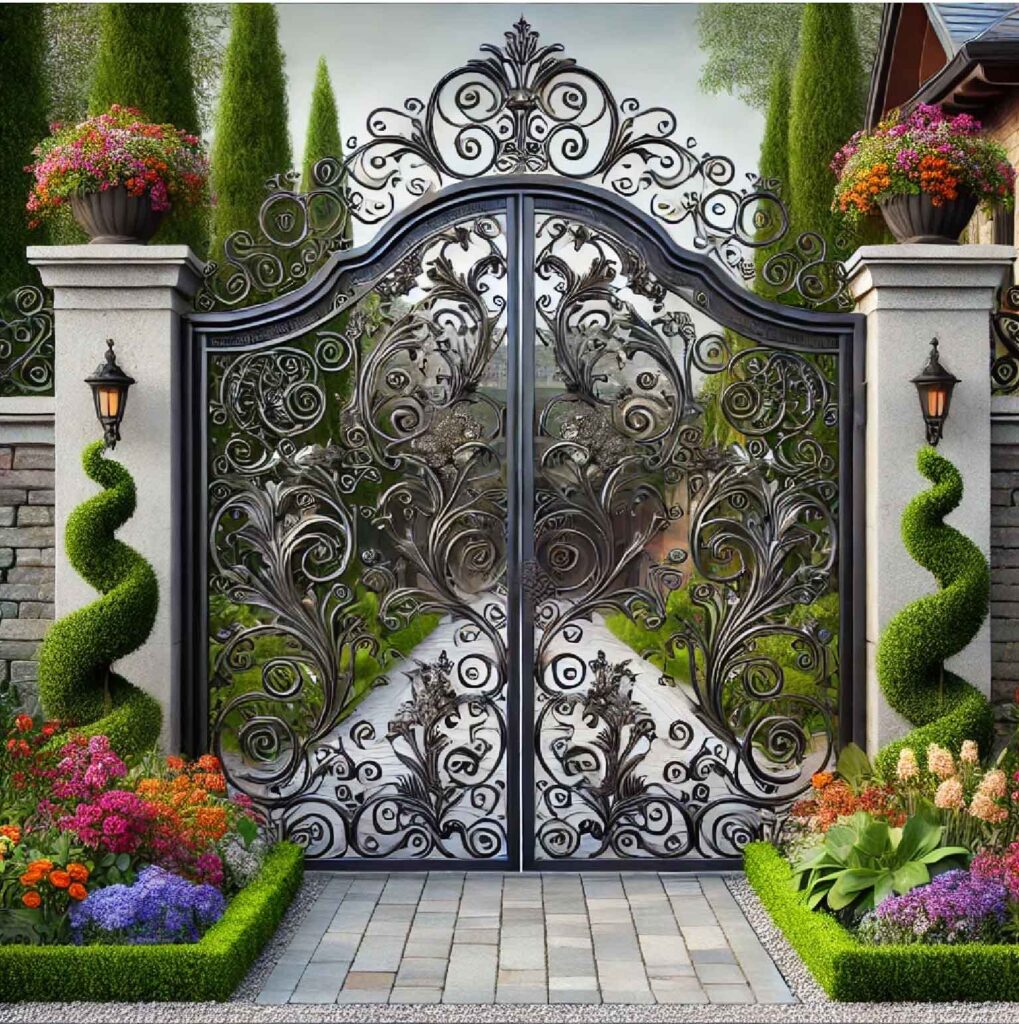
Maintenance Tips for Iron Gates
To keep your iron gate looking good and working well, regular maintenance is essential:
- Clean Regularly: Use a soft brush or cloth to clean dirt and dust from the gate. Mild soap and water can be used for a deeper clean.
- Inspect for Rust: Check for any signs of rust or corrosion, especially in areas where water tends to collect. If rust is found, remove it with a wire brush and apply a rust-resistant primer and paint.
- Lubricate Hinges: Regularly lubricate the hinges and moving parts of the gate to ensure smooth operation. Use a suitable lubricant recommended for iron gates.
- Repaint When Necessary: If the paint starts to peel or chip, repaint the gate to protect it from rust and keep it looking new.
- Check Automatic Gate Systems: For automatic gates, check the motors, sensors, and remote controls regularly to ensure they are functioning properly. Contact a professional if any issues arise.
Popular Iron Gate Styles
Iron gates come in various styles to suit different tastes and property types:
- Classic: Features simple and elegant designs with straight bars and minimal decoration. Perfect for a traditional or minimalist look.
- Ornate: Includes intricate designs, scrollwork, and decorative patterns. Suitable for those looking to make a statement and add a touch of luxury.
- Modern: Combines clean lines with geometric shapes, often using a mix of iron and other materials like glass or wood. Ideal for contemporary homes.
- Rustic: Offers a more rugged appearance with distressed finishes and simple, sturdy designs. Great for rural or farmhouse-style properties.
Where to Buy Iron Gates
You can purchase iron gates from various sources:
- Local Hardware Stores: Many hardware stores carry basic iron gates and can provide installation services.
- Specialty Stores: Stores specializing in gates and fences offer a wide range of designs and can customize gates to suit your needs.
- Online Retailers: Websites like Amazon, eBay, and specialized gate suppliers provide a variety of options that can be delivered to your home.
- Local Fabricators: For custom designs, contact a local fabricator or blacksmith who can create a gate tailored to your specific requirements.
Cost of Iron Gates
The cost of iron gates varies depending on several factors:
- Material: Wrought iron gates tend to be more expensive than steel iron gates due to their quality and craftsmanship.
- Design Complexity: Simple designs are more affordable, while ornate and customized gates may cost significantly more.
- Size: Larger gates cost more than smaller ones due to the amount of material required.
- Automation: Automatic iron gates are generally more expensive due to the cost of electronic components and installation.
FAQs About Iron Gates
1. Are iron gates a good choice for home security?
Yes, iron gates are an excellent choice for home security due to their strength and durability. They provide a strong barrier against unauthorized access.
2. How long do iron gates last?
With proper maintenance, iron gates can last for many years, often over 20 years or more.
3. Do iron gates rust easily?
Iron gates can rust over time, especially if exposed to moisture. However, regular maintenance, including cleaning and painting, can help prevent rust.
4. Can iron gates be automated?
Yes, iron gates can be fitted with automatic systems that allow them to open and close with a remote control, keypad, or sensor.
5. Are iron gates expensive?
The cost of iron gates varies depending on the material, design, size, and additional features like automation. They can range from a few hundred to several thousand dollars.
6. How often should I repaint my iron gate?
Iron gates should be repainted every 3-5 years or when you notice the paint starting to peel or chip.
Iron gates are a strong, durable, and stylish choice for any property, providing both security and aesthetic appeal. Whether you are looking for a simple gate to protect your home or an elaborate design to enhance your property’s look, iron gates offer a wide range of options to suit your needs in 2024.

